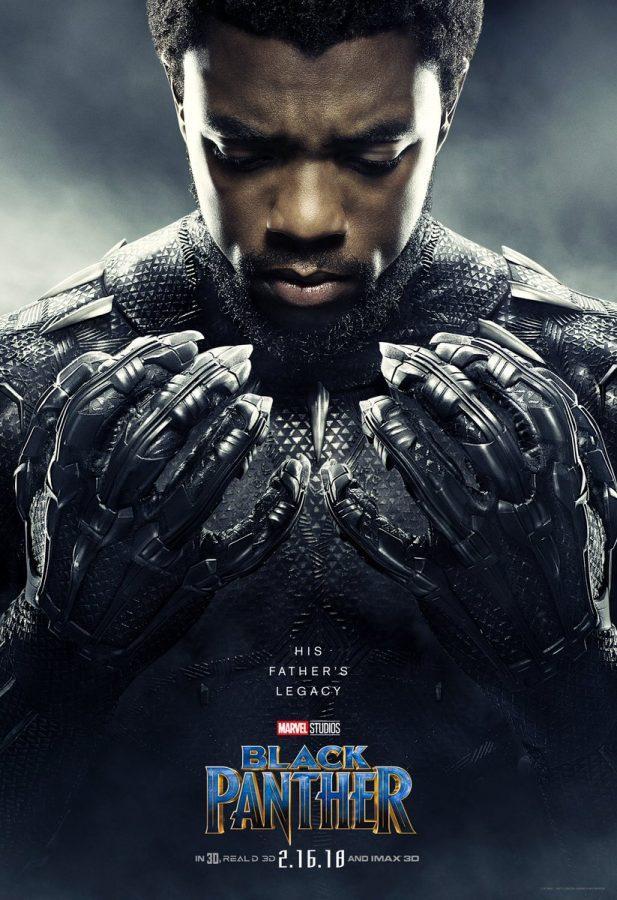‘Black Panther’ Breaks Barriers On Screen and Off
Movie poster for Marvel Studio’s “Black Panther.” Even before its Feb. 16 release date, the movie has already broke Fandango’s ticket sale record with the sale of advance tickets.
February 12, 2018
Marvel’s latest superhero story hasn’t yet hit theaters, but it’s already catalyzing change for all future films of its genre.
Audiences have been pushing for diversity in their favorite franchises for a long time, and it seems that major studios are finally taking note. From Patty Jenkins’ “Wonder Woman” to Diego Luna’s induction into ‘Star Wars,’ more people are getting the opportunity to see themselves represented as main members of the most prolific on-screen universes.
“Black Panther” isn’t slated for release until Feb. 16, but its impact has already been felt by audiences and studios alike. The film boasts a 98 percent score on Rotten Tomatoes and has outsold every preceding superhero film in advanced ticket sales, according to Fandango.com. This anticipation can be attributed to many things — including Marvel’s devoted fanbase — but to ignore the aspects of the film that diversify it from its predecessors would be to downplay the importance of diversification in the media as a whole.
Often, when discussing the relationship between race representation and media, criticism arises when the representation feels contrived. Audiences can sense when a studio doesn’t wholeheartedly support a diversity push because significantly less marketing and budget is allocated to it than to other projects. Marvel, contrarily, spared no expense and devoted $200 million to bring Wakanda to life –– a budget comparable to successes like “The Avengers” or “Captain America.”
Instead of trying to mask the narrative’s roots in black culture, Marvel chose to surround the project with black artists, including award winning filmmaker Ryan Coogler, Academy Award Winning actress Lupita Nyong’o and Grammy Award Winning rapper Kendrick Lamar, who made significant contributions to the film’s soundtrack. The film is also being released during Black History Month and features a predominantly black cast — the first film of this scale to do so.
By choosing to treat diversity as an inextricable part of the movie’s production, Marvel ensures that the universe will feel honest and authentic. Additionally, the preemptive praise and excitement proves that diversity and differentiation will help prevent the superhero genre — which has become fairly standardized — from becoming irrelevant.
NYU students and professors echo the industry’s demonstrated positive inclinations toward the film. Tisch Professor and Chief Film Critic at IndieWire Eric Kohn tweeted support for “Black Panther” on Jan. 30.
#BlackPanther is riveting on many levels: visually astonishing, but more importantly, so unpredictable. Incredible to watch a major blockbuster celebrate blackness while exploring its relationship to various facets of pop culture. “Stop scaring me,” colonizer!” #wakanda4ever
— erickohn (@erickohn) January 30, 2018
Tisch junior Jeremy Lawrence reinforces the notion that diversity seems to be an advantage for “Black Panther.”
“It looks like a serious deviation from every other Marvel movie so far, which makes me more excited for it,” Lawrence said. “So far everyone I’ve talked to seems excited too.”
To be clear, “Black Panther” is a movie that needed to be made not because it deserves to be, but because it is the kind of story that has been denied to audiences for a long time. It is an instance in film history where black characters not only take the stage but are given the stage with the support of other black creators.
While this may feel like a step forward in a changing industry, some are still skeptical as to whether the change happened organically.
“What Hollywood was doing before worked well enough for hollywood –– money-wise, at least –– and they wouldn’t really have had a reason to change anything unless people who cared said there was a problem,” Lawrence said, pointing out that change stemmed from the will of the audience.
By championing films that celebrate diversity, audiences inform studios that diversity in film shouldn’t be considered a risk. Producers have a responsibility to create better and more inclusive content just as consumers have a right to expect and demand more from the content being produced. Movies have always been about reaching and touching audiences, and if companies want to keep and expand viewership, they owe it to viewers of all races, sexes, genders and identities to be included as essential members of the stories being told.
“Black Panther” opens in theaters on Feb. 16.
A version of this article appeared in the Feb. 12 print edition.
Email Zuleyma Sanchez at [email protected].
























































































































































